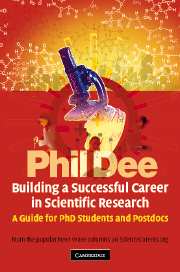Book contents
- Frontmatter
- Contents
- Foreword
- Preface
- PART I The first couple of years
- PART II The end of the beginning
- 6 Writing papers and abstracts
- 7 Conferences and poster presentations
- 8 Writing and defending your thesis
- 9 Coping with pressure and stress
- PART III The transition to post-doctoral research
- PART IV Making it in science
- Epilogue
- Web-links
- Index
6 - Writing papers and abstracts
Published online by Cambridge University Press: 05 June 2012
- Frontmatter
- Contents
- Foreword
- Preface
- PART I The first couple of years
- PART II The end of the beginning
- 6 Writing papers and abstracts
- 7 Conferences and poster presentations
- 8 Writing and defending your thesis
- 9 Coping with pressure and stress
- PART III The transition to post-doctoral research
- PART IV Making it in science
- Epilogue
- Web-links
- Index
Summary
We scientists can be slow in getting around to writing. We are totally absorbed in the search; it's what keeps us going. Most of us thrive on pushing back the perimeter fence of our own little field of research, even if our total estate only grows by a few square centimetres each working week. But this imaginary field is just that, imaginary; that is, unless we publish what we've discovered promptly. If we don't, we might find that we ‘own’ rather less of our field than we thought. Aside from hindering the progress of other scientists who could have built on our work, we might stuff up our career prospects by getting scooped. What's more, we might diminish the research standing of our host institution.
Playing a waiting game is all very proper when we need to check our results or are trying to save them up for a high-impact publication – but what if deep down it also has something to do with not liking the idea of knuckling down to writing? What if, secretly, we find it easier to keep on working in the lab than ever putting finger to keyboard? If we don't get down to writing, we are forgetting the true purpose of our job. We all listen with bated breath to explosive new data presented at a conference with a stack of supporting slides and a lot of panache; but, unless the paper eventually comes out, who will ever believe it?
- Type
- Chapter
- Information
- Building a Successful Career in Scientific ResearchA Guide for PhD Students and Postdocs, pp. 31 - 42Publisher: Cambridge University PressPrint publication year: 2006



